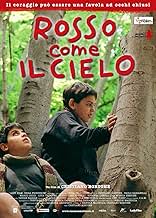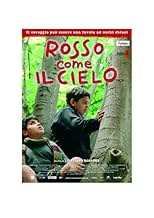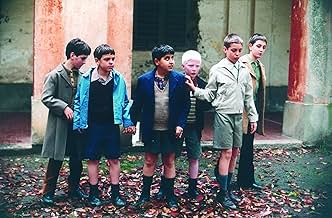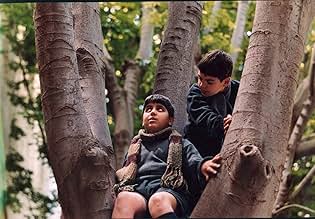IMDb RATING
7.7/10
2.1K
YOUR RATING
A nearly sightless boy is sent to a school for blind children, where he secretly discovers the possibilities of the recorded sound.A nearly sightless boy is sent to a school for blind children, where he secretly discovers the possibilities of the recorded sound.A nearly sightless boy is sent to a school for blind children, where he secretly discovers the possibilities of the recorded sound.
- Awards
- 19 wins total
- Director
- Writers
- All cast & crew
- Production, box office & more at IMDbPro
Storyline
Featured review
Occasionally, it is salutary to watch something extraordinary achieved by ordinary people to temporarily forget about the tumultuous world where we live in presently, and Italian filmmaker Cristiano Bortone's third feature film RED LIKE THE SKY is the rightly heartening crowd-pleaser saving its faintly cutesy enactment.
The film is inspired by the true story of Mirco Mencacci (Capriotti), a boy living in a sun-drenched Toscana with his parents in the 70s, whose carefree life is abruptly deprived by an accident and he is afflicted with the irreversible condition of losing his sight (the most egregious renunciation should be meted out to his parents, what kind of a parent would keep a loaded rifle hanging in their home within the reach of a child?), and according to the law, he must be sent to a Catholic school for blind kids.
The most endearing moments are always those with the real blind kids, who play Mirco's fellow schoolmates and among those, there is Felice (a cherubic Gullì), who will become Mirco's best friend. And there is a sighted girl too, Francesca (Maturanza), takes the onus as the guiding light so that they sneak out of the school in one night to listen to a movie in the local cinema and predictably develops a puppy love with Mirco. The leitmotif here is to rebel against the oppressive administration influenced by religious clout, and to embrace life through one's unique talent, for Mirco and co. is to record a fairy tale exclusively through sound and voice, an audio book graced with ingenious recordings of sound effects, that is Mirco's forte and indeed he would become a film sound mixer/editor in the future, working in Fausto Brizzi's NIGHT BEFORE THE EXAMS (2006).
Compared with Bortone's tender circumspection and undivided concentration on the children players, the film's adult wrangle, namely a sage teacher Don Giulio (Sassanelli) versus the hidebound school director (Mozzato) is squarely delivered with rigid harangue deplete of any flair and its broader social milieu is considerably skimped, to say less of its Communist undertone which an Italian might presume is what the title refers to.
A sympathetic piece of Bildungsroman most extraordinarily accomplished by a sensitive leading performance from the assumedly blind actor Luca Capriotti, the film is his only acting credit as yet. Not intending to take any shine off Bortone and his team's scrupulous dedication in coordinating a cast chiefly composed of non-professional blind kids, it is a story has an immanent and affecting strength to be hailed and proselytized universally, a windfall for any visionary raconteur.
The film is inspired by the true story of Mirco Mencacci (Capriotti), a boy living in a sun-drenched Toscana with his parents in the 70s, whose carefree life is abruptly deprived by an accident and he is afflicted with the irreversible condition of losing his sight (the most egregious renunciation should be meted out to his parents, what kind of a parent would keep a loaded rifle hanging in their home within the reach of a child?), and according to the law, he must be sent to a Catholic school for blind kids.
The most endearing moments are always those with the real blind kids, who play Mirco's fellow schoolmates and among those, there is Felice (a cherubic Gullì), who will become Mirco's best friend. And there is a sighted girl too, Francesca (Maturanza), takes the onus as the guiding light so that they sneak out of the school in one night to listen to a movie in the local cinema and predictably develops a puppy love with Mirco. The leitmotif here is to rebel against the oppressive administration influenced by religious clout, and to embrace life through one's unique talent, for Mirco and co. is to record a fairy tale exclusively through sound and voice, an audio book graced with ingenious recordings of sound effects, that is Mirco's forte and indeed he would become a film sound mixer/editor in the future, working in Fausto Brizzi's NIGHT BEFORE THE EXAMS (2006).
Compared with Bortone's tender circumspection and undivided concentration on the children players, the film's adult wrangle, namely a sage teacher Don Giulio (Sassanelli) versus the hidebound school director (Mozzato) is squarely delivered with rigid harangue deplete of any flair and its broader social milieu is considerably skimped, to say less of its Communist undertone which an Italian might presume is what the title refers to.
A sympathetic piece of Bildungsroman most extraordinarily accomplished by a sensitive leading performance from the assumedly blind actor Luca Capriotti, the film is his only acting credit as yet. Not intending to take any shine off Bortone and his team's scrupulous dedication in coordinating a cast chiefly composed of non-professional blind kids, it is a story has an immanent and affecting strength to be hailed and proselytized universally, a windfall for any visionary raconteur.
- lasttimeisaw
- Jul 30, 2017
- Permalink
Details
- Release date
- Country of origin
- Official sites
- Language
- Also known as
- Rosso come il cielo
- Production companies
- See more company credits at IMDbPro
Box office
- Gross worldwide
- $731,464
- Runtime1 hour 36 minutes
- Color
- Sound mix
- Aspect ratio
- 1.85 : 1
Contribute to this page
Suggest an edit or add missing content



















